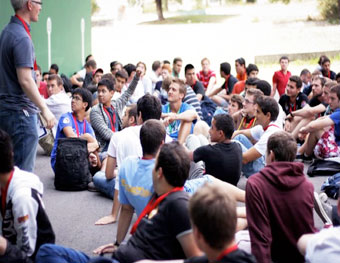September 2012 - Vol. 62
A number of years ago, a friend and co-worker came to me and said, “I need to talk to you about some serious questions that I have about the Catholic Church.” Al had been listening to a televangelist who had been systematically criticizing the various denominations, and apparently it was the Catholics’ turn. Al is a free-church assistant pastor with a number of Catholic friends. I was able to adequately address his concerns, and at the end of our discussion, I said, “Al, this was fun, but you have somehow missed the main issues!” He said, “Well, what are they?” My response was, “I’ll never tell!” That is the subject of this article…not just for Catholics, but for the Christian churches in general. It is the case that the Christian churches drift in and out of the need for reform and renewal and even restoration. Even the first century church, which gets so many positive reviews, drifted in and out of trouble.
What is needed?
The short list generated in this article is intended to be general in its observation and application. It relies heavily on scripture, as well as quotes from Baptist and Catholic Church leaders. 1. Born Again
Billy Graham has repeated this verse thousands of times to individuals, and to crowds of thousands and tens of thousands. It is the basis of the evangelical movement; it has been the theme of countless crusades, retreats, rallies, revivals, days of renewal, Bible studies, etc. Pope Benedict XVI describes this as “when the person is struck and opened by Christ…”1 Archbishop Stanislaw Rylko says, “…there is always a personal encounter with Christ.” He also says, “The greatest challenge facing the church (is) evangelization.”2 Bishop Cordes laments, “(many) have been sacramentalized but not evangelized.” Andre Fossard exclaims, “God exists and I have experienced him!”3 So, many Baptist, Catholic and other Christian leaders would agree that the number one need of the Christian church is the encounter with Christ; to be struck and opened, to be born anew; and born again to a new life in Christ: evangelism.  2. Discipleship/Formation
In speaking of the movements and new communities, Benedict XVI said, “It is their task to bring the message of Christ to the ends of the earth (Acts 1:8) and to make disciples of all men.” (Matthew 28:19).2 Bishop Rylko has said, “The first and greatest priority is, therefore, Christian formation.”3 Bishop Rylko further quotes John Paul II as equating the making of disciples with two priorities: a “solid and deep formation” and a “strong testimony.”4 “These are two areas in which the new ecclesial movements and new communities are producing stupendous fruits for the life of the church. These two groups have become true laboratories of faith and authentic schools of Christian life, holiness, and mission for thousands of Christians in every part of the World.”5  3. An Environment
of Discipleship
In addition to the one-on-one training and help, we need to be immersed in an environment that models and supports the Christian life. In this environment we witness the joy and the reality of the Christian life and we “absorb” it. The body of Christ is pastoral by its nature and is a part of the pastoral care that we receive. Finally, the environment of discipleship is also supportive to the lives of the disciplers. Those who teach and give pastoral care will also need support and encouragement. Too many Christian ministries focus on a single, gifted person who may be in danger of collapsing under the stress, or “burning out.” In the Sword of the Spirit, our approach is more corporate and more environmental. Covenant Love
Yet covenant, and covenant love are not frequent topics in Christian books and sermons. Why is that? Nothing is more repulsive to the flesh than being “locked in” or “decided.” We would always like to be doing what we “feel like” doing. Certain lawyers make a living by getting us out of clear agreements and commitments that we have made. The best phone plans are the ones where “no commitment is necessary.” After a while, we mistakenly attempt serious things (family life, starting a business, building the kingdom of God) with a “no commitment” attitude and those things are doomed to fail. Covenant and covenant love are the glue that holds the discipleship environment together. The love of God is a constant. In desiring to be perfect as our heavenly father is perfect (Matthew 5:48), we intend to model his nature, and model his love to our brothers and sisters. We are “living stones” (1 Peter 2:5) and covenant love is the mortar that allows us to be built into a city on a hill (Matthew 5:14). Word
In the Sword of the Spirit, we say we are a “community of disciples on mission.” In this short descriptive phrase, we can see those first three elements. The fact that our communities have lasted over thirty-five years is at least an initial sign that the covenant love of God and the love of the brethren are in place. This entire chapter is based on the assumption that the reader has some concern or questions about the needs of the church. Those who think everything is just fine will not be stirred by this discussion, while others may have a different list. When I first heard of the Baptism in the Spirit in 1970, I remember thinking, “I knew there was supposed to be more than what we were experiencing!” Something in me was expecting more. The scripture readings on Sundays always pointed to the hope of something more. There is more, much more, and we in the Sword of the Spirit are just scratching the surface of what the Lord has for us. “There is an urgent need for a strong testimony and Christian formation. What great need there is of living Christian communities! This is where the ecclesial movements and new communities appear. They are the answer which has been raised up by the power of the Holy Spirit to the dramatic challenge at the end of the millennium. You are this providential answer.”5 Pope John Paul II Notes [This article is excerpted from Essays on Christian Community, copyright © Bob Tedesco 2010, published by Tabor House. Used with permission.].
|
. | |||
|
publishing address: Park Royal Business Centre, 9-17 Park Royal Road, Suite 108, London NW10 7LQ, United Kingdom email: living.bulwark@yahoo.com |
. |

